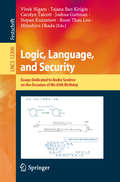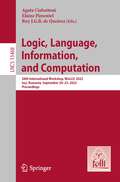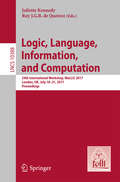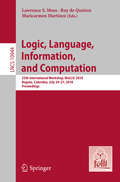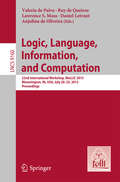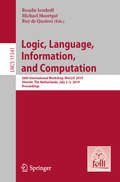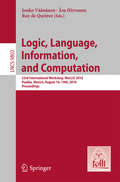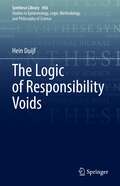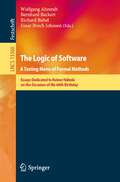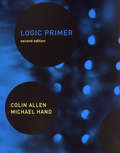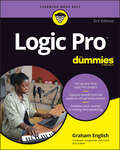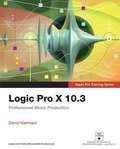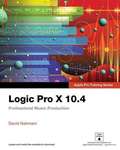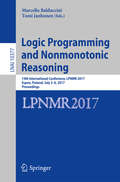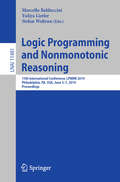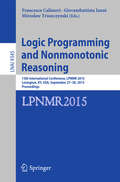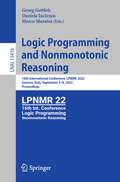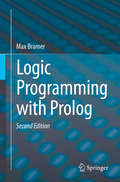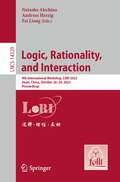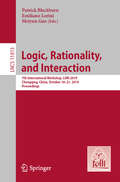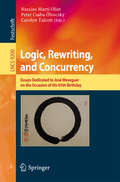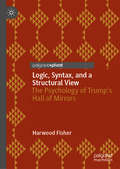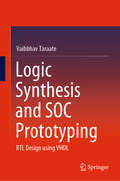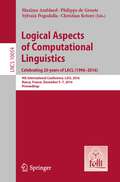- Table View
- List View
Logic, Language, and Security: Essays Dedicated to Andre Scedrov on the Occasion of His 65th Birthday (Lecture Notes in Computer Science #12300)
by Vivek Nigam Tajana Ban Kirigin Carolyn Talcott Joshua Guttman Stepan Kuznetsov Boon Thau Loo Mitsuhiro OkadaThis Festschrift was published in honor of Andre Scedrov on the occasion of his 65th birthday. The 11 technical papers and 3 short papers included in this volume show the many transformative discoveries made by Andre Scedrov in the areas of linear logic and structural proof theory; formal reasoning for networked systems; and foundations of information security emphasizing cryptographic protocols. These papers are authored by researchers around the world, including North America, Russia, Europe, and Japan, that have been directly or indirectly impacted by Andre Scedrov. The chapter “A Small Remark on Hilbert's Finitist View of Divisibility and Kanovich-Okada-Scedrov's Logical Analysis of Real-Time Systems” is available open access under a CC BY 4.0 license at link.springer.com.
Logic, Language, Information, and Computation: 28th International Workshop, WoLLIC 2022, Iași, Romania, September 20–23, 2022, Proceedings (Lecture Notes in Computer Science #13468)
by Agata Ciabattoni Elaine Pimentel Ruy J. G. B. de QueirozEdited in collaboration with FoLLI, the Association of Logic, Language and Information this book constitutes the refereed proceedings of the 28th Workshop on Logic, Language, Information and Computation, WoLLIC 2022, Iasi, Romania, in September 2022. The 25 full papers presented included with 8 extra abstracts, 5 invited talks and 3 tutorials were fully reviewed and selected from 46 submissions. The conference aims fostering interdisciplinary research in pure and applied logic.
Logic, Language, Information, and Computation
by Juliette Kennedy Ruy J. G. B. QueirozEdited in collaboration with FoLLI, the Association of Logic, Language and Information this book constitutes the refereed proceedings of the 21st Workshop on Logic, Language, Information and Communication, WoLLIC 2014, held in Valparaiso, Chile, in September 2014. The 15 contributed papers presented together with 6 invited lectures were carefully reviewed and selected from 29 submissions. The focus of the workshop was on the following subjects Inter-Disciplinary Research involving Formal Logic, Computing and Programming Theory, and Natural Language and Reasoning.
Logic, Language, Information, and Computation: 25th International Workshop, WoLLIC 2018, Bogota, Colombia, July 24-27, 2018, Proceedings (Lecture Notes in Computer Science #10944)
by Lawrence S. Moss Ruy De Queiroz Maricarmen MartinezEdited in collaboration with FoLLI, the Association of Logic, Language and Information this book constitutes the refereed proceedings of the 25th Workshop on Logic, Language, Information and Communication, WoLLIC 2018, held inBogota, Colombia, in July 2018. The 16 full papers together with 3 short papers and 3 invited talks presented were fully reviewed and selected from 30 submissions. The vision for the conference is to provide an annual forum which is large enough to provide meaningful interactions between logic and the sciences related to information and computation.
Logic, Language, Information, and Computation
by Valeria De Paiva Ruy De Queiroz Lawrence S. Moss Daniel Leivant Anjolina G. de OliveiraEdited in collaboration with FoLLI, the Association of Logic, Language and Information this book constitutes the refereed proceedings of the 22nd Workshop on Logic, Language, Information and Computation, WoLLIC 2015, held in the campus of Indiana University, Bloomington, IN, USA in July 2015. The 14 contributed papers, presented together with 8 invited lectures and 4 tutorials, were carefully reviewed and selected from 44 submissions. The focus of the workshop was on interdisciplinary research involving formal logic, computing and programming theory, and natural language and reasoning.
Logic, Language, Information, and Computation: 26th International Workshop, WoLLIC 2019, Utrecht, The Netherlands, July 2-5, 2019, Proceedings (Lecture Notes in Computer Science #11541)
by Ruy De Queiroz Rosalie Iemhoff Michael MoortgatEdited in collaboration with FoLLI, the Association of Logic, Language and Information this book constitutes the refereed proceedings of the 26th Workshop on Logic, Language, Information and Communication, WoLLIC 2019, held in Utrecht, The Netherlands, in July 2019. The 41 full papers together with 6 invited lectures presented were fully reviewed and selected from 60 submissions. The idea is to have a forum which is large enough in the number of possible interactions between logic and the sciences related to information and computation, and yet is small enough to allow for concrete and useful interaction among participants.
Logic, Language, Information, and Computation
by Jouko Väänänen Åsa Hirvonen Ruy De QueirozThis volume contains the papers presented at WoLLIC 2010: 17th Workshop on Logic, Language, Information and Computation held during July 6-9, 2010, on the campus of Universidade de Bras´ ?lia (UnB), Brazil. The Workshop on Logic, Language, Information and Computation (WoL- LIC) is an annual event, meeting every year since 1994, which aims at fostering interdisciplinary research in pure and applied logic. The idea is to have a forum which is large enough in the number of possible interactions between logic and the sciences related to information and computation, and yet is small enough to allow for concrete and useful interaction among participants. The present volume contains 13 contributed papers that were selected from among 32 submissions after a rigorous review by the Program Committee. Each submission was reviewed by at least two, and on average three, Program C- mittee members. This volume also containspapersor abstractsthat relateto the seven invited talks presented at the workshop. Between them, these papers give a snapshot of some fascinating work taking place at the frontiers between computation, logic, and linguistics. We are grateful to all the people who made this meeting possible and are responsible for its success: the members of the Program Committee and the external reviewers, the invited speakers, the contributors, and the people who were involved in organizing the workshop.
The Logic of Connective Action
by W. Lance Bennett Alexandra SegerbergThe Logic of Connective Action explains the rise of a personalized digitally networked politics in which diverse individuals address the common problems of our times such as economic fairness and climate change. Rich case studies from the United States, United Kingdom, and Germany illustrate a theoretical framework for understanding how large-scale connective action is coordinated using inclusive discourses such as "We Are the 99%" that travel easily through social media. In many of these mobilizations, communication operates as an organizational process that may replace or supplement familiar forms of collective action based on organizational resource mobilization, leadership, and collective action framing. In some cases, connective action emerges from crowds that shun leaders, as when Occupy protesters created media networks to channel resources and create loose ties among dispersed physical groups. In other cases, conventional political organizations deploy personalized communication logics to enable large-scale engagement with a variety of political causes. The Logic of Connective Action shows how power is organized in communication-based networks, and what political outcomes may result.
The Logic of Responsibility Voids (Synthese Library #456)
by Hein DuijfThis book focuses on the problem of responsibility voids: these are cases where responsibility for a morally undesirable outcome cannot be attributed to any of the involved agents. Responsibility voids are thought to occur in collective decision-making and in the context of artificial intelligent systems. In these cases, philosophers worry that there is a shortfall of moral responsibility. In particular, such voids are often assumed to justify a notion of collective responsibility that cannot be reduced to individual responsibility. One of the aims of the book is to study how collective responsibility and joint action relate to individual responsibility and individual actions. The book offers a unifying framework for modelling moral responsibility by drawing from modal logic and game theory.The book investigates the possibility and scope of the problem of responsibility voids. One of its characteristics is its pluralistic perspective on moral responsibility: in contrast to giving a unique and all-encompassing definition of it, the book makes progress by spelling out and modelling several conceptions of moral responsibility. One of the appealing features of the book is that a relatively small range of models is used to investigate a variety of conceptions of moral responsibility. The unifying framework can thus be used to characterize the conditions under which responsibility voids are ruled out.
The Logic of Software. A Tasting Menu of Formal Methods: Essays Dedicated to Reiner Hähnle on the Occasion of His 60th Birthday (Lecture Notes in Computer Science #13360)
by Wolfgang Ahrendt Bernhard Beckert Richard Bubel Einar Broch JohnsenThis Festschrift, dedicated to Reiner Hähnle on the occasion of his 60th birthday, contains papers written by many of his closest collaborators.After positions at Karlsruhe Institute of Technology and Chalmers University of Technology, since 2011 Reiner has been the chaired professor of Software Engineering at Technische Universität Darmstadt, where his team focuses on the formal verification of object-oriented software, the formal modeling and specification of highly adaptive software systems, and formal modeling and analysis in domains such as biological systems and railroad operations. His work is characterized by achievements in theory and in practical implementations, significant collaborations include the KeY project and the development of the ABS language. He has served as chair and editor of important related academic conferences, and coauthored almost 200 academic publications. The contributions in this volume reflect Reiner’s main research focus: formal methods, in particular applied to software verification.
Logic Primer
by Colin Allen Michael HandLogic Primer presents a rigorous introduction to natural deduction systems of sentential and first-order logic. Logic Primer presents a rigorous introduction to natural deduction systems of sentential and first-order logic. The text is designed to foster the student-instructor relationship. The key concepts are laid out in concise definitions and comments, with the expectation that the instructor will elaborate upon them. New to the second edition is the addition of material on the logic of identity in chapters 3 and 4. An innovative interactive Web site, consisting of a "Logic Daemon" and a "Quizmaster," encourages students to formulate their own proofs and links them to appropriate explanations in the book.
Logic Pro For Dummies
by Graham EnglishThis one-stop source for Logic Pro insight helps you spend more time creating music Every minute you spend trying to figure out how to set up a new track or build a drum loop is a minute you don’t spend creating and recording your music. This guide to the recording software favored by Mac users helps you bypass the time needed to search for tech answers and spend more time capturing sounds. Discover the full recording power of Logic Pro, starting with launching a project and recording your audio. Explore the built-in digital instruments and beat makers, augment your recording power with plug-ins, and finalize your song by editing, adding effects, mixing, mastering, and sharing. The final step is music stardom! Learn your way around the Logic Pro interface and understand the workflow Set up your project and add tracks and regions Record acoustic audio or conduct your orchestra of MIDI instruments Edit, mix, automate, export, and feel proud of your audio filesFor beginning music creators and producers, this Dummies guide makes it simple to get started with Logic Pro.
Logic Pro X 10. 3 - Apple Pro Training Series: Professional Music Production (Apple Pro Training )
by David Nahmani<P>The Apple-Certified Way to Learn <P>Record, arrange, mix, produce, and polish your music with this bestselling, Apple-certified guide to Logic Pro X 10.3. Veteran producer and composer David Nahmani uses step-by-step, project-based instructions and straightforward explanations to teach everything from basic music creation to sophisticated production techniques. Using the book’s downloadable lesson files and Logic Pro X, you’ll begin making music in the first lesson. <P>From there, you’ll learn to record audio and MIDI, create and edit sequences, and master mixing and automation techniques such as submixing with Track Stacks or the practical uses of true stereo panning. You will create both acoustic and electronic virtual drum performances using Drummer tracks with Drum Kit Designer and Drum Machine Designer. You’ll use Logic Pro X MIDI plug-ins and Smart Controls to control software synthesizers from a MIDI controller or an iPad. Flex Time will allow you to precisely edit the timing of notes inside an audio recording, and you’ll explore Flex Pitch to correct the pitch of a vocal recording. Finally, you’ll mix, automate, and master the song, using plug-ins to process only selected sections or entire tracks, giving your audio creations the final polish needed to achieve a professional sound. <P>Downloadable lesson and media files allow you to perform the hands-on exercises. <br>Focused lessons take you step by step through practical, real-world tasks. <br>Ample illustrations help you master techniques fast. <br>Lesson goals and time estimates help you plan your time. <br>Chapter review questions help you prepare for the Logic Pro X 10.3 certification exam. <P>The Apple Pro Training Series is both a self-paced learning tool and the official curriculum of the Apple Training and Certification program. Upon completing the course material in this guide, you can become Apple Certified by passing the Logic Pro X 10.3 certification exam at an Apple Authorized Training Provider. To find an Apple Authorized Training Provider near you, please visit training.apple.com. <P>Also in the Apple Pro Training Series: <br>Final Cut Pro X 10.3 <br>Pages, Numbers, and Keynote <br>macOS Support Essentials
Logic Pro X 10. 4 - Apple Pro Training Series: Professional Music Production (Apple Pro Training)
by David NahmaniRecord, arrange, mix, produce, and polish your audio files with this best-selling, Apple-certified guide to Logic Pro X 10.4. Veteran producer and composer David Nahmani uses step-bystep, project-based instructions and straightforward explanations to teach everything from basic music creation to sophisticated production techniques. Using the book’s downloadable lesson files and Logic Pro X, you’ll begin making music in the first lesson. From there, learn to record audio and MIDI data, create and edit sequences, and master mixing and automation techniques such as submixing with track stacks. Create both acoustic and electronic virtual drum performances using Drummer tracks with Drum Kit Designer and Drum Machine Designer. Use Logic Pro X MIDI FX and Smart Controls to control software synthesizers from a MIDI controller or an iPad. Harness the power of Smart Tempo to make sure all recordings, imported audio files, and samples play in time. Flex Time allows you to precisely edit the timing of notes inside an audio recording, and you’ll explore Flex Pitch to correct the pitch of a vocal recording. Finally, you mix, automate, and master the song, using plug-ins to process only selected sections or entire tracks, giving your audio creations the final polish needed to achieve a professional sound. Downloadable lesson and media files allow you to perform the hands-on exercises. Focused lessons take you step by step through practical, real-world tasks. Accessible writing style puts an expert instructor at your side Ample illustrations help you master techniques fast. Lesson goals and time estimates help you plan your time. Chapter review questions summarize what you’ve learned and help you prepare for the Apple certification exam.
Logic Programming and Nonmonotonic Reasoning
by Marcello Balduccini Tomi JanhunenThis Festschrift volume, published in honor of Michael Gelfond on the occasion of his 65th birthday, contains a collection of papers written by his closest friends and colleagues. Several of these papers were presented during the Symposium on Constructive Mathematics in Computer Science, held in Lexington, KY, USA on October 25-26, 2010. The 27 scientific papers included in the book focus on answer set programming. The papers are organized in sections named "Foundations: ASP and Theories of LP, KR, and NMR", "ASP and Dynamic Domains", and "ASP - Applications and Tools".
Logic Programming and Nonmonotonic Reasoning: 15th International Conference, LPNMR 2019, Philadelphia, PA, USA, June 3-7, 2019, Proceedings (Lecture Notes in Computer Science #11481)
by Marcello Balduccini Yuliya Lierler Stefan WoltranThis book constitutes the refereed proceedings of the 15th International Conference on Logic Programming and Nonmonotonic Reasoning, LPNMR 2019, held in Philadelphia, PA, USA, in June 2019.The 22 full papers and 3 short papers presented in this volume were carefully reviewed and selected from a total of 39 submissions. The papers were organized in topical sections named: applications; argumentation; foundations and complexity; knowledge representation and reasoning; and systems.
Logic Programming and Nonmonotonic Reasoning
by Francesco Calimeri Giovambattista Ianni Miroslaw TruszczynskiThis volume contains the refereed proceedings of the 13th International Conference on Logic Programming and Nonmonotonic Reasoning, LPNMR 2015, held in September 2015 in Lexington, KY, USA. The 290long and 11 short papers presented together with 3 invited talks, the paper reporting on the Answer Set Programming competition, and four papers presented by LPNMR student attendees at the doctoral consortium were carefully reviewed and selected from 60 submissions. LPNMR is a forum for exchanging ideas on declarative logic programming, nonmonotonic reasoning, and knowledge representation. The aim of the LPNMR conferences is to facilitate interactions between researchers interested in the design and implementation of logic-based programming languages and database systems, and researchers who work in the areas of knowledge representation and nonmonotonic reasoning.
Logic Programming and Nonmonotonic Reasoning: 16th International Conference, LPNMR 2022, Genova, Italy, September 5–9, 2022, Proceedings (Lecture Notes in Computer Science #13416)
by Marco Maratea Georg Gottlob Daniela InclezanThis book constitutes the refereed proceedings of the 16th International Conference on Logic Programming and Nonmonotonic Reasoning, LPNMR 2022, held in Genova, Italy, in September 2022. The 34 full papers and 5 short papers included in this book were carefully reviewed and selected from 57 submissions. They were organized in topical sections as follows: Technical Contributions; Systems; Applications.
Logic Programming with Prolog
by Max BramerLogic Programming is the name given to a distinctive style of programming, very different from that of conventional programming languages such as C++ and Java. By far the most widely used Logic Programming language is Prolog. Prolog is a good choice for developing complex applications, especially in the field of Artificial Intelligence. Logic Programming with Prolog does not assume that the reader is an experienced programmer or has a background in Mathematics, Logic or Artificial Intelligence. It starts from scratch and aims to arrive at the point where quite powerful programs can be written in the language. It is intended both as a textbook for an introductory course and as a self-study book. On completion readers will know enough to use Prolog in their own research or practical projects. Each chapter has self-assessment exercises so that readers may check their own progress. A glossary of the technical terms used completes the book. This second edition has been revised to be fully compatible with SWI-Prolog, a popular multi-platform public domain implementation of the language. Additional chapters have been added covering the use of Prolog to analyse English sentences and to illustrate how Prolog can be used to implement applications of an 'Artificial Intelligence' kind. Max Bramer is Emeritus Professor of Information Technology at the University of Portsmouth, England. He has taught Prolog to undergraduate computer science students and used Prolog in his own work for many years.
Logic, Rationality, and Interaction: 9th International Workshop, LORI 2023, Jinan, China, October 26–29, 2023, Proceedings (Lecture Notes in Computer Science #14329)
by Natasha Alechina Andreas Herzig Fei LiangThis LNCS book is part of the FOLLI book series and constitutes the proceedings of the 9th International Workshop on Logic, Rationality, and Interaction, LORI 2023, held in Jinan, China, in October 2023.The 15 full papers presented together with 7 short papers in this book were carefully reviewed and selected from 40 submissions. The workshop covers a wide range on the following topics such as agency; argumentation and agreement; belief representation; probability and uncertainty; belief revision and belief merging; knowledge and action; dynamics of informational attitudes; intentions, plans, and goals; decision making and planning; preference and utility; cooperation; strategic reasoning and game theory; epistemology; social choice; social interaction; speech acts; knowledge representation; norms and normative systems; natural language; rationality; philosophical logic.
Logic, Rationality, and Interaction: 7th International Workshop, LORI 2019, Chongqing, China, October 18–21, 2019, Proceedings (Lecture Notes in Computer Science #11813)
by Patrick Blackburn Emiliano Lorini Meiyun GuoThis LNCS book is part of the FOLLI book series and constitutes the proceedings of the 7th International Workshop on Logic, Rationality, and Interaction, LORI 2019, held in Chongqing, China, in October 2019.The 31 papers presented in this book were carefully reviewed and selected from 56 submissions. They focus on the following topics: agency; argumentation and agreement; belief revision and belief merging; belief representation; cooperation; decision making and planning; natural language; philosophy and philosophical logic; and strategic reasoning.
Logic, Rewriting, and Concurrency
by Carolyn Talcott Peter Csaba Ölveczky Narciso Martí-OlietThis Festschrift volume contains 28 refereed papers including personal memories, essays, and regular research papers by close collaborators and friends of José Meseguer to honor him on the occasion of his 65th birthday. These papers were presented at a symposium at the University of Illinois at Urbana-Champaign on September 23-25, 2015. The symposium also featured invited talks by Claude and Hélène Kirchner and by Patrick Lincoln. The foreword of this volume adds a brief overview of some of José's many scientific achievements followed by a bibliography of papers written by José.
Logic, Syntax, and a Structural View: The Psychology of Trump's Hall of Mirrors
by Harwood FisherThis book presents a new structural approach to the psychology of the person, inspired by Kenneth Colby’s computer-generated simulation, PARRY. The simulation was of a paranoid psychological state, represented in forms of the person's logic and syntax, as these would be evidenced in personal communication. Harwood Fisher uses a Structural View to highlight similarities in the logical form of the linguistic representations of Donald Trump, his avid followers (“Trumpers”), and the paranoid—referred to as “The Trio.” He demonstrates how the Structural View forms a series of logical and schematic patterns, similar to the way that content analysis can bring forth associations meanings, and concepts held in the text. Such comparisons, Fisher argues, can be used to shed light on contingencies for presenting, representing, and judging truth. Specifically, Fisher posits that the major syntactic and logical patterns that were used to produce the computer-generated “paranoid” responses in Colby’s project can be used to analyze Donald Trump’s rhetoric and his followers’ reactions to it. Ultimately, Fisher offers a new kind of structural approach for the philosophy of psychology. This novel work will appeal to students and scholars of social and cognitive psychology, psychology of personality, psychiatric classification, psycholinguistics, rhetoric, and computer science.
Logic Synthesis and SOC Prototyping: RTL Design using VHDL
by Vaibbhav TaraateThis book describes RTL design, synthesis, and timing closure strategies for SOC blocks. It covers high-level RTL design scenarios and challenges for SOC design. The book gives practical information on the issues in SOC and ASIC prototyping using modern high-density FPGAs. The book covers SOC performance improvement techniques, testing, and system-level verification. The book also describes the modern Xilinx FPGA architecture and their use in SOC prototyping. The book covers the Synopsys DC, PT commands, and use of them to constraint and to optimize SOC design. The contents of this book will be of use to students, professionals, and hobbyists alike.
Logical Aspects of Computational Linguistics. Celebrating 20 Years of LACL: 9th International Conference, LACL 2016, Nancy, France, December 5-7, 2016, Proceedings (Lecture Notes in Computer Science #10054)
by Maxime Amblard Philippe De Groote Sylvain Pogodalla Christian RetoréEdited under the auspices of the Association of Logic, Language andInformation (FoLLI), this book constitutes the refereed proceedings ofthe 20th anniversary of the International Conference on LogicalAspects of Computational Linguistics, LACL 2016, held in LORIA Nancy,France, in December 2016. The 19 contributed papers, presentedtogether with 4 invited papers and 6 abstracts, were carefullyreviewed and selected from 38 submissions. The focus of the conferenceis the use of type theoretic, proof theoretic, and model theoreticmethods for describing and formalising natural language syntax,semantics, and pragmatics as well as the implementation of thecorresponding tools.
